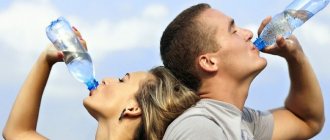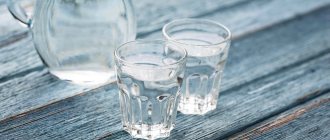You can often hear statements like this: “You should definitely start your morning with water”, “You can’t drink before, during or after meals”, “2 liters daily, there’s no other way”, “Tea and coffee don’t count”, “Dehydration leads to premature aging ", etc. There are so many myths around that many people can’t figure it out. Let's figure out together how much water you really need to drink.
The role of water in our life
The topic of how much water to drink never leaves our lives. Water is the basis of all life on Earth, the key to health, longevity and fertility. Opinions even among doctors are completely opposite. Let's try to figure out how much water you need to drink per day.
Neither people, nor animals, nor plants can live without water. Not every person can live without food for a month, and without water for a maximum of a week (with elevated body temperature and no more than three days). The total amount of water in the human body, depending on its weight and age, ranges from 55 to 78% of body weight, our brain is 80% water, and the human embryo is 97% water.
Water has always been treated as some kind of miracle; at all times it has been worshiped, idolized and extolled as a shrine.
However, recently, thanks to the research of scientists, the availability of theories and practices of other peoples and traditions, water has begun to be talked about as a panacea. Calls to drink as much water as possible, namely water and not any other liquid, are heard everywhere; there are opinions of drinking water in a volume of 2 - 3 or more liters per day, reaching up to five.
Moreover, these recommendations are completely unrelated to the individuality of each person:
- human weight;
- his physical activity;
- ambient temperature;
- caloric intake;
- individual physiology of each;
- health status
- the age of the person.
One call for everyone: drink water and you will be healthy! The notorious 8 glasses, and somewhere around 10 and even 12, do not leave the Internet pages about health.
What are the dangers of dehydration?
Here are just a few complications of Dehydration that loss of fluid can lead to.
Urinary and kidney problems
Prolonged or repeated bouts of dehydration can cause urinary tract infections, kidney stones, and even kidney failure.
Convulsions
Together with sweat and urine, electrolytes (sodium, potassium and others) are removed from the body. Meanwhile, they are the ones who help carry electrical signals from cell to cell. Due to a lack of moisture and electrolytes, signals can become confused, which often leads to involuntary muscle contractions - cramps, and sometimes even loss of consciousness.
Hypovolemic shock
This is the name for a decrease in blood volume, and its connection with dehydration is also obvious, because blood largely consists of water. Hypovolemic shock causes a sharp drop in blood pressure, and also leads to the fact that organs and tissues receive less oxygen. This is a very dangerous complication.
So, maybe you should start pouring water into yourself glass by glass to prevent either unpleasant symptoms or more serious complications? Stop, stop. To be fair, we note that water is a medicine that can become poison if overdosed.
Where did the call for 2-3 liters of water come from?
- For the first time, such recommendations for quantity began to appear with the advent of the theory of vegetarian and even raw food nutrition, from people adhering to alternative nutrition methods. But the key word there is WATER, that is, a call for the predominance of water in the diet, replacing tea, coffee, and compotes with it.
- It is believed that drinking water manufacturers came up with this rule in an effort to increase sales.
- Another version: nutritionists dealing with the problem of weight loss - losing weight - began to focus on increasing water consumption.
But most likely all three factors coincided here and the myth about the volume of 2-3 liters of water began to impose itself on everyone.
Let's try to figure out whether the immense consumption of simple, even absolutely pure water is so beneficial and important for everyone. I foresee objections and even anger from H2O supporters!










